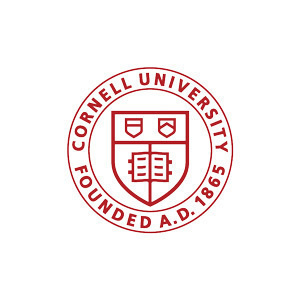Cornell Center for Antimicrobial Resistance Research and Education Inaugural Symposium

March 22nd & 23rd
Register here for this 2-day event.
Food, travel, and accommodations provided.
Wednesday, March 22
7:00 am – 7:00 pm, Uris Auditorium, Weill Cornell Medicine, New York, NY
Bus departure from Ithaca, 7:00 am
(arrival in NYC about 11 am)
Lunch, 11:30 am
Welcome and Introductions, 12:15 pm
Session 1: Back to basics — Understanding the ‘M’ of AMR
12:30 – 2:30 pm
The lipid II cycle as a target for antibiotics
John Helmann, Professor, Department of Microbiology, College of Agriculture and Life Sciences
Outer membrane modifications promote high-level beta lactam tolerance in Gram-negative pathogens
Tobias Dörr, Associate Professor, Department of Microbiology, College of Agriculture and Life Sciences
Stalling the ribosome to speed up the search for new antibiotics
Heather Feaga, Assistant Professor, Department of Microbiology, College of Agriculture and Life Sciences
Mycobacterial mediators of intrinsic antibiotic resistance and tolerance
Sabine Ehrt, Professor, Department of Microbiology & Immunology, Weill Cornell Medicine
Session 1 Keynote, 2:30-3:30 pm
Optogenetic feedback control of gene expression and antibiotic resistance in single cells
Mary Dunlop, Associate Professor, College of Engineering, Boston University
Introduction of the Center for Antimicrobial Resistance Research & Education, 3:30 – 4:30 pm
Co-Directors Craig Altier and Kyu Rhee
Poster Session with Refreshments, Griffis Faculty Club, 4:30 – 6:00 pm
(beer/wine and light snacks)
Dinner at The Alvin Public House, 406 E 64th St, 6:30 pm
Thursday, March 23
7:30 am – 5:00 pm, Uris Auditorium, Weill Cornell Medicine, New York, NY
Breakfast, 7:30 am
Session 2 Keynote, 8:30 – 9:30 am
From molecular mechanisms to policy: antibiotic resistance in Neisseria gonorrhoeae
Yonatan Grad, Melvin J. and Geraldine L. Glimcher Associate Professor of Immunology and Infectious Diseases, Department of Immunology and Infectious Diseases, T.H. Chan School of Public Health, Harvard University
Session 2: Taking stock and sizing up the OneHealth ecology of AMR
9:30 – 12:00 pm
Antimicrobial resistance detection in clinical microbiology
Lars Westblade, Associate Professor, Pathology and Laboratory Medicine and Department of Medicine, Division of Infectious Diseases; Director of Clinical Microbiology, New York-Presbyterian Hospital- Weill Cornell Medicine
Antimicrobial resistance in foodborne pathogens: Salmonella and beyond
Martin Wiedmann, Gellert Family Professor, Department of Food Science, College of Agriculture and Life Sciences
Deciphering the extent to which clinically relevant AMR genes transfer within the gut microbiome
Ilana Brito, Associate Professor, Mong Family Sesquicentennial Faculty Fellow in Biomedical Engineering, Meinig School of Biomedical Engineering
Antimicrobial use in animal agriculture through a One Health lens – How much is used and can we use less?
Renata Ivanek, Professor, Department of Population Medicine and Diagnostic Sciences, College of Veterinary Medicine
Insight from the social and behavioral sciences on AMR: Communication, context and motivation
Amelia Greiner Safi, Professor of Practice, Department of Public and Ecosystem Health, College of Veterinary Medicine
Lunch with Working Groups, 12:00 – 1:00 pm
WG1 Collaborative Opportunities for Novel Therapy Development
Goals:
- Identify clinical problems (“data gaps”) of tolerance and resistance that need to be addressed
- Create collaborations between applied/clinical scientists and basic scientists to develop integrated translational program projects.
- Create new antibiotics based upon novel targets
- Develop alternatives to antibiotics that target the pathogen or the host response
WG2 Collaborative Opportunities in Pathology, Pharmacy and the Clinical Environment
Goals:
- Develop new means to track resistant organisms and their resistance genes
- Provide rapid and accurate susceptibility tests to aid clinical decisions
WG3 Epidemiology/Public Health/Stewardship
Goals:
- Monitor antimicrobial resistance in pathogens of medical and veterinary importance
- Develop public health strategies to prevent the emergence of antimicrobial resistance based upon these data
- Identify antimicrobial stewardship practices that ensure enhanced clinical outcomes in animal and human populations
Session 3: Taking the ‘R’ out of AMR: Innovative approaches to targeting resistant pathogens
1:00 – 3:30 pm
Novel approaches to targeting animal to human transmission of foodborne pathogens
Craig Altier, Professor of Population Medicine and Diagnostic Sciences, College of Veterinary Medicine
Scalable fluidic tools for addressing antimicrobial resistance
Nate Cira, Assistant Professor, Meinig School of Biomedical Engineering
Studying susceptibility to overcome resistance: Riffing off rifampicin
Kyu Rhee, Professor of Medicine, Weill Cornell Medical College
Fluid dynamics-based approaches to microbial infection and decontamination
Sunny Jung, Professor, Department of Biological and Environmental Engineering, College of Agriculture and Life Sciences
New Frontiers in CRISPR-Cas, beyond RNA-guided nucleases
Ailong Ke, Robert J. Appel Professor, Department of Molecular Biology and Genetics, College of Agriculture and Life Sciences
Session 3 Keynote, 3:30 – 4:30 pm
AMR from a scientific perspective: Selected topics
Carl Nathan, R.A. Rees Pritchett Professor of Microbiology, Weill Cornell Medicine
Summary and Concluding Remarks, 4:30 pm
Meeting adjourned, 4:45 pm
Bus departure for Ithaca, 5:00 pm
Boxed meals for traveling guests


